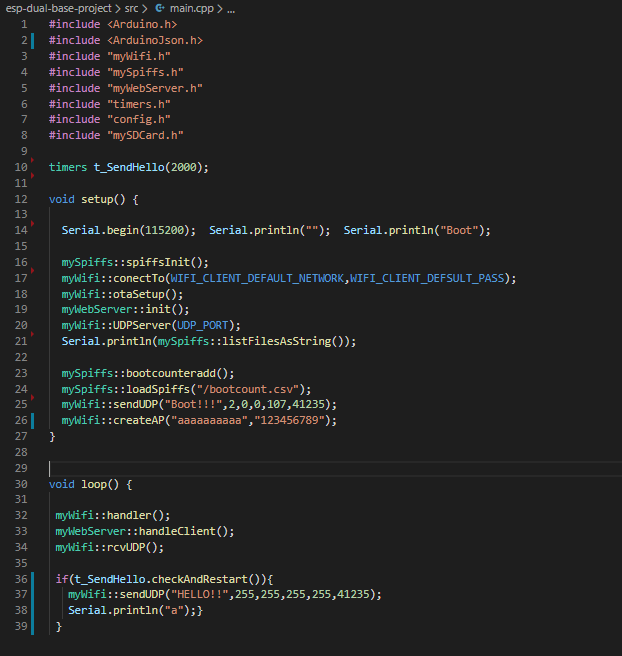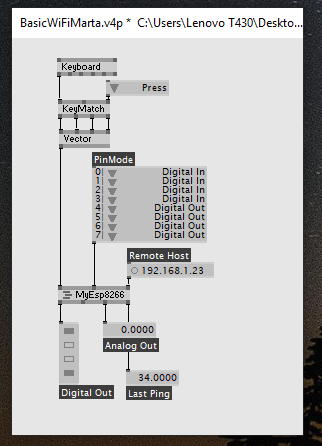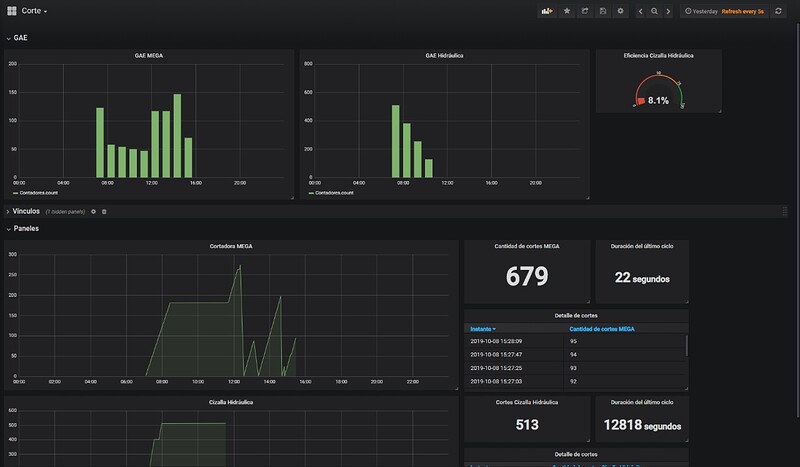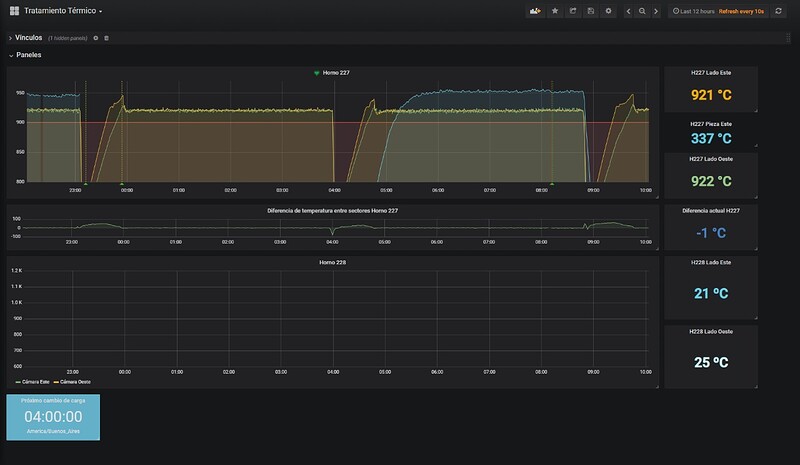IoT & Firmata made easy!
One Sentence: Whats happening in your workshop?
We will learn how program and interact with the most powerful SOC ESP8266/ESP32 to make standalone, lan, or wan data networking, and even p2p kilometers distance LoRa links, using vvvv in the most easy and effortless way possible, with ready to use code.
What is the actual output of your workshop/lecture/presentation?
Knowledge to interact with small devices with wireless capabilities to run small programs capable to doing things without computer or internet, doing thins with computers and no internet, doing things with computer plus internet, or doing things alone and talking with other board Kilometers distances using LoRa/p2pEspNow/UDP.
Do you see the workshop/lecture/presentation possibly relating to the NODE 2020 leitmotif?
YES, we will learn how to make a standalone IOT system ( server, sensors, database , without internet access and just a raspy and lots of ESP32/8266) to measure things we care, how much water we use, how much watts we use, how long did we left our AC on?
If we cant measure a behavior, we can not improve it. IoT its about measurements, once we know what we do, we will be able to improve.
In which of the three categories does your workshop fall: beginner, intermediate, advanced
VVVV/gamma, and electronics beginners &intermediate, we will have some advance stuff over the end, but we will see if we have time, we will go fast.
What knowledge do you presume your participants have?
Basic vvvv and networking skills, and electronics, also basic and intermediate.
Some ESP32/ESP8266 board. I will bring several of them, sensors switchs and buttons to avoid spending money!
Which tools (hardware and software) will be used and learned?
VVVV/Gamma
C++ using VisualStudio Code + Platformio
NodeRed
BasicJS for NodeRed
What will attendees of your workshop/lecture/presentation learn?
We all love Arduino and how easy it makes to start with electronics, and once we have control over the arduino, we love to control those nice lights and motors and led from other places, but here is the problem, we need a usb cable, and this have several disadvantages in safety regarding electronics ( we dont wanna burn a usb port of a 1000usd laptoc due a wrong connection on 5v rail), so we use Ethernet, but the project gets bigger, and bulky and expensive, So what do we do ?
Well, we will use the most powerful, most small, and most popular hardware at the moment, the ESP8266/ESP32, and we will make out project 100% wireless using all kinds of topology and protocols, we will be able to do IOT under 5€. We will be able to connect relay and all kind of sensors to measure whatever we want, and we will learn how this can help us to reduce our carbon footprint.
Also we wont be stuck on 10 meters of Bluetooth of 100 meters of wifi, we will go further, much further with LoRa, to archive kilometers of radio communication, without breaking the law!
What technical requirements does your workshop have (apart from internet and a projector)?
A router
ESP32/ESP826 board ( I will bring 20 + Sensors )
RaspberryPi ( I will bring one )
Projector and a WebCam
How do you qualify for the topic?
I develop my own PCBs to make ArtnetToDmx boards and ArtnetToWs2812 pixel led strips, I have been selling this boards for years, and also I made a workshop about Dmx&VVVV last node, but this same hardware with a different use can be super useful to improve out quality of live. At the moment I’m measuring water consumption of my house, energy usage using ModBus industrial equipment’s, and turning on/off lights of my house to save energy. Im doing the same in factories measuring resoures and mixing IoT with industrial productivity. Also I am electronic fanboy that loves to mix sensors to vvvv for no reason !
I love to mix anything with VVVV.
Stepper + Leapmotion https://www.youtube.com/watch?v=PMZd9qjkD2s
In 2014 to move several steppers we needed to use a router + arduino + rs232 links bewteen arduinos + cables + wiring …
this part of how we made a project back then
This is the final project
https://www.instagram.com/p/Bvk3PbSH80S/
Now this is using a esp8266+imu+small lipo, 8 euros project
and that device is making the acces point
https://www.instagram.com/p/BwDwqF4HzKf/
do you need a remote control for your wireless Ir paint brush? no problem
https://www.instagram.com/p/Bwt75CqHf9E/
Need control of 2 reles to turn off ligths over the internet?
https://www.instagram.com/p/Bw5-19BFDEh/
Need to develop a IoT system for a industrial application?
https://www.instagram.com/p/Bv4wiZ4HEMO/
What happened in the workshop?
We will program ESP32/ESP8266 boards with VisualStudioCode+Platformio for a much better experience than Arduino IDE, we will learn how to make a soft sketch to be able to program the board only once, and be able to move that board/project to others networks without the need of re flashing the board, we will learn how to save or variables and data inside a non volatile memory, how to use http request to handle data, how to send and receive UDP to interact with VVVV, and I will present a new kind of “WiFirmata” to make this process easy as possible. We will learn how to interact with this devices using our phone and browser, and we will go IOT using public/local mqtt servers or BlinkApp
1 Turn on our device, if the board can’t find our network it will put itself in Access point mode so we can connect to it, save new wifi credentials IDs and variables.
2 The device will join our network, and we will see it under VVVV by using UDP broadcast discovery feature
3 From vvvv we will be able to ( in real time ) re program IO to inputs/outputs, control them, read analog inputs, or sensor data
By doing this, adding a hardware layer to our installation will be as simple as possible, witl little, almost no code needed, just vvvv/gamma patching.
Who was the target audience of the workshop?
Any vvvv/gamma user who wants to get into electronics, or learn a little more about arduino, c++ self made libraries, hobbyist, HAM radio operators who wants to learn a little bit about LoRa and IOT.
What did attendees of the workshop learn?
- Digital Electronics Basics
- How to send / receive HTTP GET/POST to control our device
- How to send / recive UDP packages from vvvv/any other app
- How to interact with I2c sensors
- How to understand LoRa packages
- How to add AES encryption to our wireless data
- How to use ESPNOW protocol for super fast and power efficient battery devices
- How to setup super fast an IOT server on a raspberry pi with a front end (Grafana) a database, and MQTT broker, and a super powerful NodeRed system for stand alone sensor logging
Who would be your ideal co-host?
Anyone who knows a little about electronics and C++ and have some experience with IoT
This is all the code that we will need
We also will learn how to flash a .bin file with the code ready, so there is also no need to use Arduino IDE/VsCode, just vvvv and a 1 Line Python line to burn the firmware


This is the fron tend that we will build en 10 minutes to view all out sensors data


